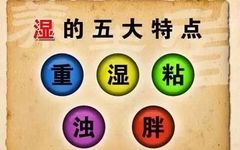Dampness is the source of myriad diseases. When dampness accumulates severely in the body, we may experience dizziness, a heavy head, oily skin, heavy limbs, lower back soreness, weakness, swollen joints, and a general feeling of lethargy, just wanting to lie down; often feeling bloated after eating, with symptoms of difficulty urinating, soft and unformed stools, feeling as if we cannot fully empty our bowels, etc.;
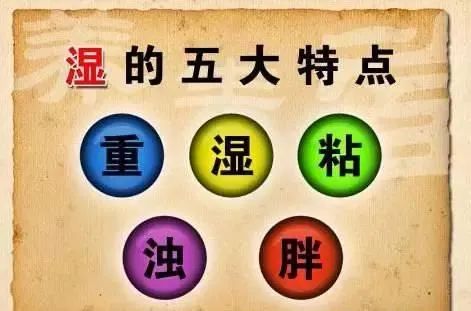
At the same time, the accumulation of dampness can transform into phlegm, leading to symptoms such as coughing and phlegm production,with phlegm seeming endless, a sensation of something stuck in the throat, and upon examining the tongue, the coating appears white and greasy, possibly with tooth marks on the sides…If you have the above symptoms, it is time to eliminate dampness! The understanding of dampness in Chinese culture is best represented by the Sage of Medicine, Zhang Zhongjing. Zhang Zhongjing deeply understood the essence of dampness and thus prescribed a formula that became the foundational formula for eliminating dampness, from which all subsequent dampness-eliminating formulas have been derived.It is the Ling Gui Zhu Gan Tang, from Zhang Zhongjing’s Jin Kui Yao Lue.
Ingredients: 12g Fu Ling (Poria), 9g Gui Zhi (Cinnamon Twig, peeled), 6g Bai Zhu (Atractylodes, white), and 6g Gan Cao (Licorice, roasted).
Method: Combine the four ingredients with six liters of water, boil to obtain three liters, strain, and divide into three warm doses.
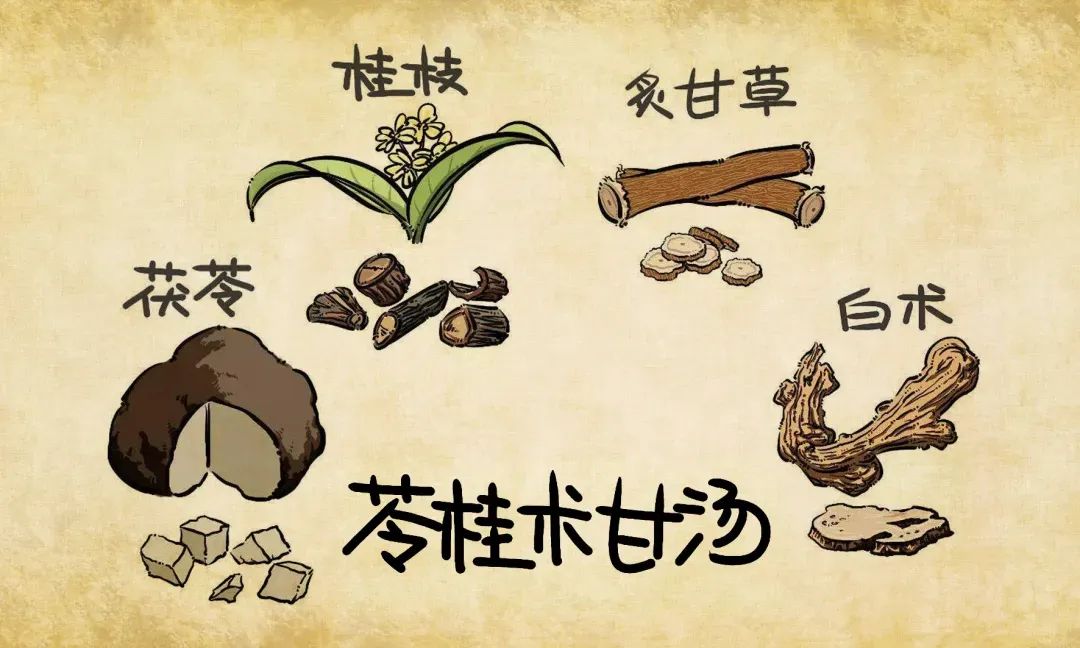
Why is it called the timeless formula for eliminating dampness? Because in this formula, the Sage of Medicine, Zhang Zhongjing, cleverly employed three methods to eliminate dampness, fundamentally cutting off its source.1. Promoting urination — Fu Ling Promoting urination, also known as diuresis, simply means using diuretic herbs to expel dampness directly from the body through urination. Some may ask, can’t we just eat foods like red beans and coix seeds to eliminate dampness? Indeed, red beans and coix seeds are diuretic foods, and they may have some effect initially, but gradually they become ineffective. This is because most diuretic herbs are cold in nature, and long-term consumption can harm the spleen and stomach, thereby worsening dampness. Therefore, in Ling Gui Zhu Gan Tang, red beans and coix seeds are not used; instead, Fu Ling, which is neutral and does not harm the spleen and stomach, is employed. Fu Ling has a sweet and bland flavor, and it enters the heart, spleen, and kidney meridians, primarily functioning to promote urination and drain dampness, effectively cutting off the generation of phlegm and fluid at its source. Its advantage lies in its ability to protect the spleen and stomach during the process of eliminating dampness. It can treat symptoms such as chest tightness, cough, and body fatigue caused by phlegm and fluid accumulation.
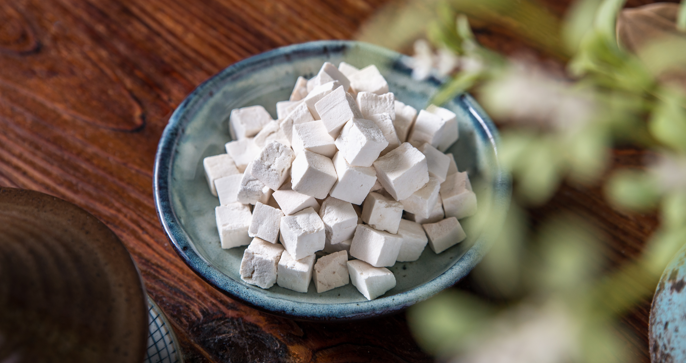
2. Draining dampness — Gui Zhi Draining dampness means using herbs that induce sweating to allow dampness to seep out through the skin, similar to how we sweat. However, some individuals may have insufficient heart qi and weak heart yang, making it difficult for them to sweat, even in hot weather when others are sweating profusely. Sweating is an important channel for detoxification; if one cannot sweat, how can dampness be eliminated? In such cases, it is necessary to strengthen the heart yang.Gui Zhi in Ling Gui Zhu Gan Tang can strengthen heart yang and promote sweating to drain dampness.Gui Zhi warms yang, promotes water metabolism, and transforms qi to facilitate urination. When paired with Fu Ling, it enhances the effect of warming yang and promoting water metabolism. It primarily treats symptoms such as cold hands and feet, edema, and chest tightness caused by yang deficiency and fluid stagnation. Moreover, Gui Zhi generates yang energy, providing warmth to the body, which can awaken the spleen and stomach that have become cold and stagnant due to excessive consumption of cold foods.
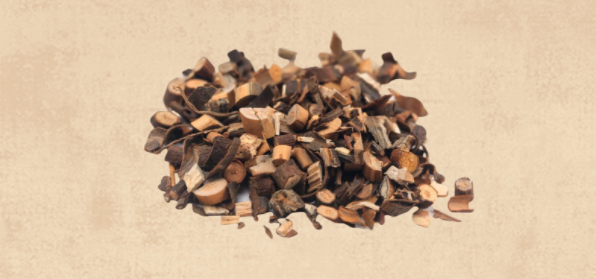
3. Drying dampness — Bai Zhu Drying dampness means using warming and tonifying herbs to dry out damp substances, similar to how we dry a wet towel over a fire. For example, when we place a wet towel over a fire, the moisture in the towel evaporates. This is the process of drying dampness.So who is responsible for drying dampness? Bai Zhu in Ling Gui Zhu Gan Tang is an expert at drying dampness. At this point, some may wonder, isn’t drying dampness just treating the symptoms? How do we treat the root cause? The answer is to cut off the source of dampness. Otherwise, if you are expelling dampness while the source continues to produce it, isn’t that a futile effort?The Huang Di Nei Jing states: “All dampness and swelling belong to the spleen,” indicating that the source of dampness lies in the spleen. To cut off the source of dampness, we must first nourish the spleen and stomach. Furthermore, in the five elements of TCM, the spleen belongs to earth, which can control water. Therefore, to fundamentally eliminate dampness, we must first strengthen the spleen, which is where Bai Zhu comes into play.Bai Zhu has the effect of tonifying the spleen and eliminating dampness, as we say, water and dampness accumulate to form phlegm, and spleen deficiency leads to improper transformation of fluids, resulting in dampness. When used together with Fu Ling, it enhances the effects of tonifying the spleen and eliminating dampness, directly addressing the root of the problem. It can also treat symptoms such as poor appetite and excessive salivation caused by spleen deficiency.
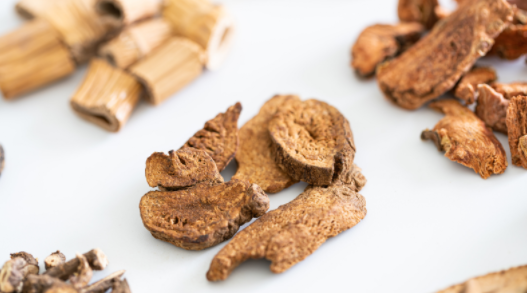
In conclusion, Ling Gui Zhu Gan Tang, with its simple four ingredients, tonifies the spleen and eliminates dampness, fundamentally cutting off dampness👇👇Fu Ling promotes urination, expelling dampness through urination from the spleen and stomach;Gui Zhi drains dampness, allowing dampness to seep out through the skin from the spleen and stomach;Bai Zhu dries dampness, transforming usable water into vapor, just like drying a towel over a fire.
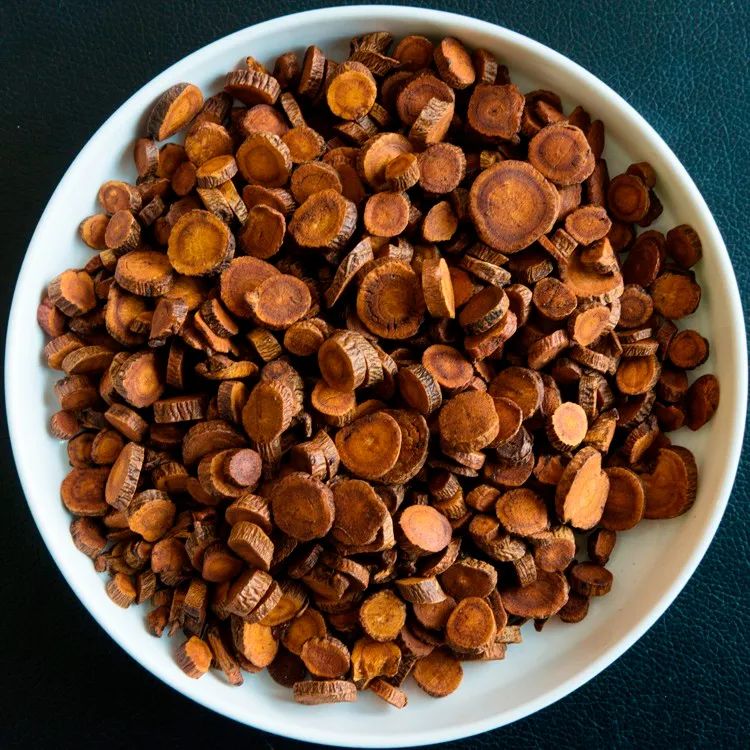
Finally, adding roasted Gan Cao stabilizes the spleen and stomach, harmonizing these herbs to enhance their efficacy. The combination of these four herbs not only can dissipate phlegm and fluid but also distribute body fluids, tonify the spleen, promote urination, and eliminate internal dampness. Of course, to completely eliminate all dampness, one must also engage in regular exercise, as it can relieve stress, activate the functioning of bodily organs, and accelerate the expulsion of dampness from the body.

